27 dec 2018

Israeli settlers set up in the Khallet Makhoul area in the Jordan Valley in the northern occupied West Bank, on Wednesday.
Local activist Aaref Daraghmeh reported that Israeli settlers set up tents in Khallet Makhoul to use for their sheep.
Daraghmeh expressed concerns that erecting these tents could lead to a settlement outpost that would eventually become a new illegal Israeli settlement.
The Jordan Valley forms a third of the occupied West Bank, with 88 percent of its land classified as Area C -- under full Israeli military control.
57 percent of the land in the Jordan Valley has been declared closed military zones, also known as a "firing zones," where Israeli army forces routinely train using live ammunition and explosive devices.
Nearly 20 percent of the occupied West Bank has been declared "firing zones" since the 1970s, but according to the UN, some 80 percent of these areas are not in fact used for military training.
However, when military training does take place, Israeli forces families to leave their homes for hours or days at a time until the drill is over.
Local activist Aaref Daraghmeh reported that Israeli settlers set up tents in Khallet Makhoul to use for their sheep.
Daraghmeh expressed concerns that erecting these tents could lead to a settlement outpost that would eventually become a new illegal Israeli settlement.
The Jordan Valley forms a third of the occupied West Bank, with 88 percent of its land classified as Area C -- under full Israeli military control.
57 percent of the land in the Jordan Valley has been declared closed military zones, also known as a "firing zones," where Israeli army forces routinely train using live ammunition and explosive devices.
Nearly 20 percent of the occupied West Bank has been declared "firing zones" since the 1970s, but according to the UN, some 80 percent of these areas are not in fact used for military training.
However, when military training does take place, Israeli forces families to leave their homes for hours or days at a time until the drill is over.

The Israeli occupation forces (IOF) at dawn Thursday raided homes and kidnapped several Palestinian citizens in different West Bank areas.
In Tulkarem, the IOF kidnapped two citizens and clashed with young men during a campaign in Tulkarem refugee camp.
Local sources told the Palestinian Information Center (PIC) that Israeli soldiers aboard seven military vehicles stormed Tulkarem camp and kidnapped two ex-detainees identified as Musa'ab al-Hasri and Haytham Balidi from their homes.
The IOF also stormed areas around Tulkarem city and set up a checkpoint on Anabta road.
In Nablus, two Palestinian young men were taken prisoners during an IOF campaign in Balata refugee camp and Asira town.
In Bethlehem, violent clashes broke out in al-Deheisheh refugee camp between local youths and Israeli soldiers after the latter tried to kidnap a young man called Mohamed Abu Akar from the camp.
The IOF also broke into and ransacked a house belonging to the mayor of the Tuqu town in the east of Bethlehem, without making arrests.
A young man identified as Mohamed Bannat was reportedly taken prisoner last night at the Container checkpoint, east of Bethlehem.
An Israel military force also stormed Kobar town in Ramallah and smashed the door of a reception room belonging to the family of al-Barghouthi.
In al-Khalil, Israeli soldiers physically assaulted a Palestinian young man with special needs called Sammour al-Rajabi near the Ibrahimi Mosque.
In a separate incident, a horde of Jewish settlers infiltrated at dawn Thursday Huwara town in Nablus and smashed windows of several Palestinian cars.
In Tulkarem, the IOF kidnapped two citizens and clashed with young men during a campaign in Tulkarem refugee camp.
Local sources told the Palestinian Information Center (PIC) that Israeli soldiers aboard seven military vehicles stormed Tulkarem camp and kidnapped two ex-detainees identified as Musa'ab al-Hasri and Haytham Balidi from their homes.
The IOF also stormed areas around Tulkarem city and set up a checkpoint on Anabta road.
In Nablus, two Palestinian young men were taken prisoners during an IOF campaign in Balata refugee camp and Asira town.
In Bethlehem, violent clashes broke out in al-Deheisheh refugee camp between local youths and Israeli soldiers after the latter tried to kidnap a young man called Mohamed Abu Akar from the camp.
The IOF also broke into and ransacked a house belonging to the mayor of the Tuqu town in the east of Bethlehem, without making arrests.
A young man identified as Mohamed Bannat was reportedly taken prisoner last night at the Container checkpoint, east of Bethlehem.
An Israel military force also stormed Kobar town in Ramallah and smashed the door of a reception room belonging to the family of al-Barghouthi.
In al-Khalil, Israeli soldiers physically assaulted a Palestinian young man with special needs called Sammour al-Rajabi near the Ibrahimi Mosque.
In a separate incident, a horde of Jewish settlers infiltrated at dawn Thursday Huwara town in Nablus and smashed windows of several Palestinian cars.
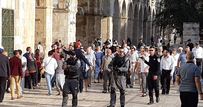
At least 16 extremist Jewish settlers on Thursday morning desecrated the Aqsa Mosque’s courtyards under police protection.
Local sources said that more groups of settlers could enter the Mosque and tour its courtyards in the morning and the afternoon.
Meanwhile, the Israeli police at the entrances leading to the Mosque imposed entry restrictions on Muslim worshipers during the presence of settlers at the holy site.
The Israeli police allow Jewish settlers to enter and tour the Mosque every day except on Fridays and Saturdays.
Local sources said that more groups of settlers could enter the Mosque and tour its courtyards in the morning and the afternoon.
Meanwhile, the Israeli police at the entrances leading to the Mosque imposed entry restrictions on Muslim worshipers during the presence of settlers at the holy site.
The Israeli police allow Jewish settlers to enter and tour the Mosque every day except on Fridays and Saturdays.
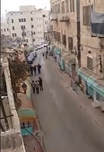
Al-Shuhada Street
Israeli settlers verbally assaulted and threatened a Palestinian to kill him, in the southern occupied West Bank city of Hebron, on Thursday morning.
Ziad al-Sharabati told Ma’an that he was threatened by three Israeli settlers as he was helping international activists who were escorting children to cross the al-Shuhada Street checkpoint on their way to their school.
Al-Sharabati added that the settlers verbally assaulted him and cursed him and the international activists before threatening all of them.
He pointed out that Israeli settlers verbally assault and curse at international activists helping locals in an attempt to force them out of the area.
Palestinian residents of the Old City of Hebron face a large Israeli military presence on a daily basis, with at least 32 permanent and partial checkpoints set up at the entrances of many streets.
Additionally, Palestinians are not allowed to drive on al-Shuhada street, have had their homes and shops on the street welded shut, and in some areas of the Old City, are not permitted to walk on certain roads.
Meanwhile, Israeli settlers move freely on the street, drive cars, and carry machine guns.
Israeli settlers verbally assaulted and threatened a Palestinian to kill him, in the southern occupied West Bank city of Hebron, on Thursday morning.
Ziad al-Sharabati told Ma’an that he was threatened by three Israeli settlers as he was helping international activists who were escorting children to cross the al-Shuhada Street checkpoint on their way to their school.
Al-Sharabati added that the settlers verbally assaulted him and cursed him and the international activists before threatening all of them.
He pointed out that Israeli settlers verbally assault and curse at international activists helping locals in an attempt to force them out of the area.
Palestinian residents of the Old City of Hebron face a large Israeli military presence on a daily basis, with at least 32 permanent and partial checkpoints set up at the entrances of many streets.
Additionally, Palestinians are not allowed to drive on al-Shuhada street, have had their homes and shops on the street welded shut, and in some areas of the Old City, are not permitted to walk on certain roads.
Meanwhile, Israeli settlers move freely on the street, drive cars, and carry machine guns.
26 dec 2018
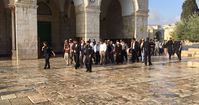
Dozens of Israeli settlers and police officers broke into al-Aqsa Mosque on Wednesday morning.
Local sources said that the Israeli police allowed 44 settlers to enter al-Aqsa Mosque for a morning tour.
They added that 8 high-level police officers, 15 Jewish notables, and 20 tour guides stormed the Mosque during the same period.
Another group of Israelis is expected to come for a second round of settler break-in into the Mosque following noon prayer.
Local sources said that the Israeli police allowed 44 settlers to enter al-Aqsa Mosque for a morning tour.
They added that 8 high-level police officers, 15 Jewish notables, and 20 tour guides stormed the Mosque during the same period.
Another group of Israelis is expected to come for a second round of settler break-in into the Mosque following noon prayer.
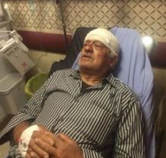
An elderly Palestinian man was injured on Wednesday in an Israeli settler attack near Burqa village, northwest of Nablus city.
Anti-settlement activist Ghassan Daghlas said that a group of Israeli settlers brutally assaulted Mufid Hejji, 70, while he was herding his sheep on his farmland near the evacuated settlement of Homesh, which had been established on Palestinian-owned lands in Burqa.
Hejji, who suffered some head injuries, was taken to Rafidia Hospital in Nablus for treatment, Daghlas added.
Anti-settlement activist Ghassan Daghlas said that a group of Israeli settlers brutally assaulted Mufid Hejji, 70, while he was herding his sheep on his farmland near the evacuated settlement of Homesh, which had been established on Palestinian-owned lands in Burqa.
Hejji, who suffered some head injuries, was taken to Rafidia Hospital in Nablus for treatment, Daghlas added.

by Madeeha Araj, PNN
In its latest weekly report about Israeli settlements activities in the occupied West Bank, including Jerusalem, the National Bureau for the Defense of Land stated as follows…
The course of hatred and attacks on the Palestinian people continue and take a more dangerous curve following the formation of more organized and coordinated extremist groups, in the West Bank, that launched calls under the title, “There’s operations, no Arabs.”
Moreover, they called for gathering at road 60, which extends from Hebron to Nablus, in order to prevent Palestinians from using it. In their calls, the settlers wrote to Netanyahu that, if he fails to protect them, they will act themselves. Bit-Eil settlement council head Bin Yashai told Israeli army leaders that he and other settlers would prevent the re-opening of the road.
According to Israeli information and reports, settler attacks on Palestinians classified as hate crimes have increased by 60%, from the previous year of 2017. Data indicate that, in 2017, there were 79 cases of aggression, but 2018 recorded 127 cases, which means approximately one assault every three days, to include the puncturing of car tires, the uprooting of trees, racist slogans painted on walls, physical assault, killing and assaulting animals. The highest number of attacks was recorded in the villages of Nablus, Ramallah and Hebron governorates.
The Israeli army guarantees the protection of settlers, on the streets of the occupied West Bank, with concrete cubes and other obstacles. The army has also reinforced its numbers in several battalions throughout the West Bank, to ensure the maximum protection of the psychological and material rights of settlers. “It is unreasonable to have an operation, and, the next day, waiting to have the same,” said deputy president of the Knesset Israel Yishlar, who called for the duplication of checkpoints by adding 12 new ones.
Thus, the Israeli government has developed a way to punish Palestinians through building more illegal settlements, though violating international law and its resolutions, the latest being resolution 2334 of 2016, which condemns the Israeli settlement policy.
Within this context, the Gush Etzion settlement council confirmed the completion of a plan to build of 14,864 new settlement units in the settlements of Gush Etzion, located between Bethlehem and Hebron.
The head of the settlement council said that the new construction would triple the number of settlers in Gush Etzion, adding that the construction of settlement units has been planned for a year and a half, with the construction of 1,100 settlement units in the settlement of Tzurim, 600 in the Magdal Oz settlement, 1,107 units in the settlement of Ga’ot and 1,200 units between Beit Ayin and Magdal Oz, to have a geographical connection. NIS 18.9 million was paid for the planning only.
In a related matter, in the city of Hebron in particular, an internal report for the International Monitoring Force found that the city was collapsing under the burden of occupation and settlers, and that Israel is breaking international law, as Palestinians are regularly attacked, their freedom of movement and their right to access places of worship violated.
“Hebron is more divided today than ever before because of the actions of the Israeli government and the settlers.” said the report, which also also stated that Israel is constantly violating Article 49 of the Fourth Geneva Convention, which prohibits the deportation of persons under occupation, and “normal life” is not available anywhere in the city, especially in the Old Town area – located in Area H2. The report indicated violations of road construction on Palestinian-owned land, particularly at the Qiryat Arba settlement in central Hebron, and the destruction of Palestinian homes that were built since the Ottoman period.
The European Union expressed its deep concern over the demolition of a school in the area of Al-Simeya, north of Hebron, in Area C, on December 5th.
The European Union, in a statement issued by its representative, said, “This is the 5th time that the Israeli authorities demolish or confiscate school buildings or kindergartens in the West Bank, in 2018.”
The total number of schools, in Area C and East Jerusalem, which have been ordered demolished or left unfinished in them, were 50, which led to the creation of a compelling environment affecting more than 5,000 school children.
In its latest weekly report about Israeli settlements activities in the occupied West Bank, including Jerusalem, the National Bureau for the Defense of Land stated as follows…
The course of hatred and attacks on the Palestinian people continue and take a more dangerous curve following the formation of more organized and coordinated extremist groups, in the West Bank, that launched calls under the title, “There’s operations, no Arabs.”
Moreover, they called for gathering at road 60, which extends from Hebron to Nablus, in order to prevent Palestinians from using it. In their calls, the settlers wrote to Netanyahu that, if he fails to protect them, they will act themselves. Bit-Eil settlement council head Bin Yashai told Israeli army leaders that he and other settlers would prevent the re-opening of the road.
According to Israeli information and reports, settler attacks on Palestinians classified as hate crimes have increased by 60%, from the previous year of 2017. Data indicate that, in 2017, there were 79 cases of aggression, but 2018 recorded 127 cases, which means approximately one assault every three days, to include the puncturing of car tires, the uprooting of trees, racist slogans painted on walls, physical assault, killing and assaulting animals. The highest number of attacks was recorded in the villages of Nablus, Ramallah and Hebron governorates.
The Israeli army guarantees the protection of settlers, on the streets of the occupied West Bank, with concrete cubes and other obstacles. The army has also reinforced its numbers in several battalions throughout the West Bank, to ensure the maximum protection of the psychological and material rights of settlers. “It is unreasonable to have an operation, and, the next day, waiting to have the same,” said deputy president of the Knesset Israel Yishlar, who called for the duplication of checkpoints by adding 12 new ones.
Thus, the Israeli government has developed a way to punish Palestinians through building more illegal settlements, though violating international law and its resolutions, the latest being resolution 2334 of 2016, which condemns the Israeli settlement policy.
Within this context, the Gush Etzion settlement council confirmed the completion of a plan to build of 14,864 new settlement units in the settlements of Gush Etzion, located between Bethlehem and Hebron.
The head of the settlement council said that the new construction would triple the number of settlers in Gush Etzion, adding that the construction of settlement units has been planned for a year and a half, with the construction of 1,100 settlement units in the settlement of Tzurim, 600 in the Magdal Oz settlement, 1,107 units in the settlement of Ga’ot and 1,200 units between Beit Ayin and Magdal Oz, to have a geographical connection. NIS 18.9 million was paid for the planning only.
In a related matter, in the city of Hebron in particular, an internal report for the International Monitoring Force found that the city was collapsing under the burden of occupation and settlers, and that Israel is breaking international law, as Palestinians are regularly attacked, their freedom of movement and their right to access places of worship violated.
“Hebron is more divided today than ever before because of the actions of the Israeli government and the settlers.” said the report, which also also stated that Israel is constantly violating Article 49 of the Fourth Geneva Convention, which prohibits the deportation of persons under occupation, and “normal life” is not available anywhere in the city, especially in the Old Town area – located in Area H2. The report indicated violations of road construction on Palestinian-owned land, particularly at the Qiryat Arba settlement in central Hebron, and the destruction of Palestinian homes that were built since the Ottoman period.
The European Union expressed its deep concern over the demolition of a school in the area of Al-Simeya, north of Hebron, in Area C, on December 5th.
The European Union, in a statement issued by its representative, said, “This is the 5th time that the Israeli authorities demolish or confiscate school buildings or kindergartens in the West Bank, in 2018.”
The total number of schools, in Area C and East Jerusalem, which have been ordered demolished or left unfinished in them, were 50, which led to the creation of a compelling environment affecting more than 5,000 school children.
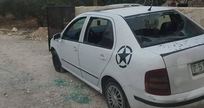
A horde of Jewish settlers on Tuesday night attacked Palestinian cars and property at the main entrance to Burqa village, northwest of Nablus in the occupied West Bank.
A local official reported that settlers hurled stones at Palestinian vehicles as they were traveling on a road near Burqa village, which caused damage to some of their windows.
He added that the settlers also smashed traffic lights, destroyed trees and destroyed the doors of a pharmacy at the entrance to the village.
A local official reported that settlers hurled stones at Palestinian vehicles as they were traveling on a road near Burqa village, which caused damage to some of their windows.
He added that the settlers also smashed traffic lights, destroyed trees and destroyed the doors of a pharmacy at the entrance to the village.
25 dec 2018
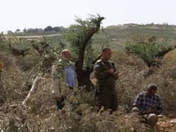
Illegal Israeli colonialist settlers from Beit Yair colony, which was built on Palestinian lands east of Yatta, south of the southern West Bank city of Hebron cut and uprooted, on Tuesday morning, at least 200 olive saplings.
Rateb Jabour, the coordinator of the National Committee against the Annexation Wall and Colonies in southern West Bank, said the colonists invaded a Palestinian olive orchard, owned By Barakat Mohammad Morr, and uprooted more than 200 saplings.
He added that the colonists, from Susiya illegal outpost, also invaded Palestinian lands, owned by members of Nawaj’a family, and plowed them.
Rateb Jabour, the coordinator of the National Committee against the Annexation Wall and Colonies in southern West Bank, said the colonists invaded a Palestinian olive orchard, owned By Barakat Mohammad Morr, and uprooted more than 200 saplings.
He added that the colonists, from Susiya illegal outpost, also invaded Palestinian lands, owned by members of Nawaj’a family, and plowed them.
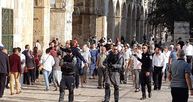
Dozens of Israeli settlers on Tuesday morning broke into al-Aqsa Mosque amid heavy police presence.
Jerusalem's Islamic Awqaf Department told Quds Press that 50 Israeli settlers forced their way into al-Aqsa Mosque and performed Talmudic rituals at al-Rahma Gate.
The Islamic Awqaf said that 20 students from religious institutes and Hebrew universities, as well as 42 Israeli police officers, were present in the site during the morning raid.
Israeli settlers carry out daily break-ins into al-Aqsa Mosque, except on Fridays and Saturdays. They are usually conducted in two rounds: the morning and the afternoon.
According to the Islamic Awqaf, the settlers enter the site through al-Maghareba Gate, which has been under Israeli control since 1967, and leave through al-Silsila Gate while accompanied by large police forces.
Jerusalem's Islamic Awqaf Department told Quds Press that 50 Israeli settlers forced their way into al-Aqsa Mosque and performed Talmudic rituals at al-Rahma Gate.
The Islamic Awqaf said that 20 students from religious institutes and Hebrew universities, as well as 42 Israeli police officers, were present in the site during the morning raid.
Israeli settlers carry out daily break-ins into al-Aqsa Mosque, except on Fridays and Saturdays. They are usually conducted in two rounds: the morning and the afternoon.
According to the Islamic Awqaf, the settlers enter the site through al-Maghareba Gate, which has been under Israeli control since 1967, and leave through al-Silsila Gate while accompanied by large police forces.
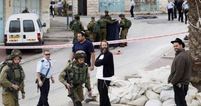
A number of Palestinians were injured on Tuesday morning when Israeli settlers attacked Palestinian homes in Tal Rumeida neighborhood in al-Khalil.
The PIC reporter said that dozens of Israeli settlers living in a nearby settlement bloc stormed the neighborhood and attacked Palestinian homes for the families of Abu Eisha, Zahda, and Abu Haikal.
Three Palestinian young men identified as Ahmad Abu Eisha, Khaled Zahda, and Hasan Abu Haikal were moderately injured as they were violently beaten by the settlers.
The injured were later transferred to a local hospital for treatment, the PIC reporter added.
The PIC reporter said that dozens of Israeli settlers living in a nearby settlement bloc stormed the neighborhood and attacked Palestinian homes for the families of Abu Eisha, Zahda, and Abu Haikal.
Three Palestinian young men identified as Ahmad Abu Eisha, Khaled Zahda, and Hasan Abu Haikal were moderately injured as they were violently beaten by the settlers.
The injured were later transferred to a local hospital for treatment, the PIC reporter added.
24 dec 2018
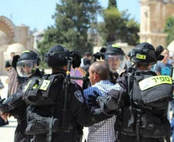
Israeli soldiers assaulted and abducted, Monday, a Palestinian employee of the Waqf and Islamic Endowment Department in the Al-Aqsa Mosque, in occupied East Jerusalem, and took them to an unknown destination.
The employee has been identified as Ashraf Sharabati, and was taken prisoner after groups of soldiers, police officers and colonialist settlers invaded the courtyards of the holy site, and conducted provocative tours, after removing the Palestinians.
The employee has been identified as Ashraf Sharabati, and was taken prisoner after groups of soldiers, police officers and colonialist settlers invaded the courtyards of the holy site, and conducted provocative tours, after removing the Palestinians.
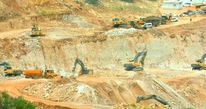
Israeli settlers' bulldozers on Monday morning started razing Palestinian-owned farmlands in Batn al-Hamam area, west of Salfit city, eyewitnesses said.
The witnesses told the PIC reporter that the industrial area of Ariel settlement is being expanded at the expense of fertile farmlands owned by Palestinian citizens in Salfit.
The Palestinian researcher Khaled Ma'ali said that many bulldozing operations are taking place in different villages and towns in Salfit in favor of settlement expansion projects.
Ma'ali stressed that the settlement expansion blatantly violates international humanitarian law, which prohibits settlement and any construction activity by the occupying power on the territories it occupies.
The witnesses told the PIC reporter that the industrial area of Ariel settlement is being expanded at the expense of fertile farmlands owned by Palestinian citizens in Salfit.
The Palestinian researcher Khaled Ma'ali said that many bulldozing operations are taking place in different villages and towns in Salfit in favor of settlement expansion projects.
Ma'ali stressed that the settlement expansion blatantly violates international humanitarian law, which prohibits settlement and any construction activity by the occupying power on the territories it occupies.
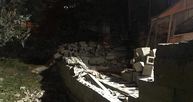
Israeli settlers on Sunday evening demolished a Palestinian-owned room in Tal Rumeida neighborhood in al-Khalil.
Eyewitnesses said that the Israeli occupation forces arrested the Palestinian citizen Nader Abu Mayyala at a military checkpoint near the city.
The witnesses said that the Israeli forces further opened fire at a Palestinian vehicle passing through a checkpoint at the northern entrance to al-Khalil. No injuries were reported.
Local sources said that earlier on Sunday the Israeli forces installed a checkpoint at the northern entrance to al-Khalil, searched the Palestinian vehicles passing in the area, and scrutinized the passengers' IDs.
Meanwhile in Beit Ummar town, north of al-Khalil, the Israeli forces raided a gas station and closed it by a military order.
Eyewitnesses said that the Israeli occupation forces arrested the Palestinian citizen Nader Abu Mayyala at a military checkpoint near the city.
The witnesses said that the Israeli forces further opened fire at a Palestinian vehicle passing through a checkpoint at the northern entrance to al-Khalil. No injuries were reported.
Local sources said that earlier on Sunday the Israeli forces installed a checkpoint at the northern entrance to al-Khalil, searched the Palestinian vehicles passing in the area, and scrutinized the passengers' IDs.
Meanwhile in Beit Ummar town, north of al-Khalil, the Israeli forces raided a gas station and closed it by a military order.

Israeli settlers at dawn Monday erected a mobile house on the lands of Battir village, west of Bethlehem.
Activist Ibrahim Awadallah said in press statements that a group of Israeli settlers, escorted by Israeli soldiers, stormed the village and set up the caravan in preparation for establishing a new settler outpost.
Awadallah said that the Israeli forces prevented the owners of the targeted lands from approaching their property.
He pointed out that a few days ago Israeli settlers started the construction of a new road in the area, but they were confronted and stopped by the village's residents.
Activist Ibrahim Awadallah said in press statements that a group of Israeli settlers, escorted by Israeli soldiers, stormed the village and set up the caravan in preparation for establishing a new settler outpost.
Awadallah said that the Israeli forces prevented the owners of the targeted lands from approaching their property.
He pointed out that a few days ago Israeli settlers started the construction of a new road in the area, but they were confronted and stopped by the village's residents.
